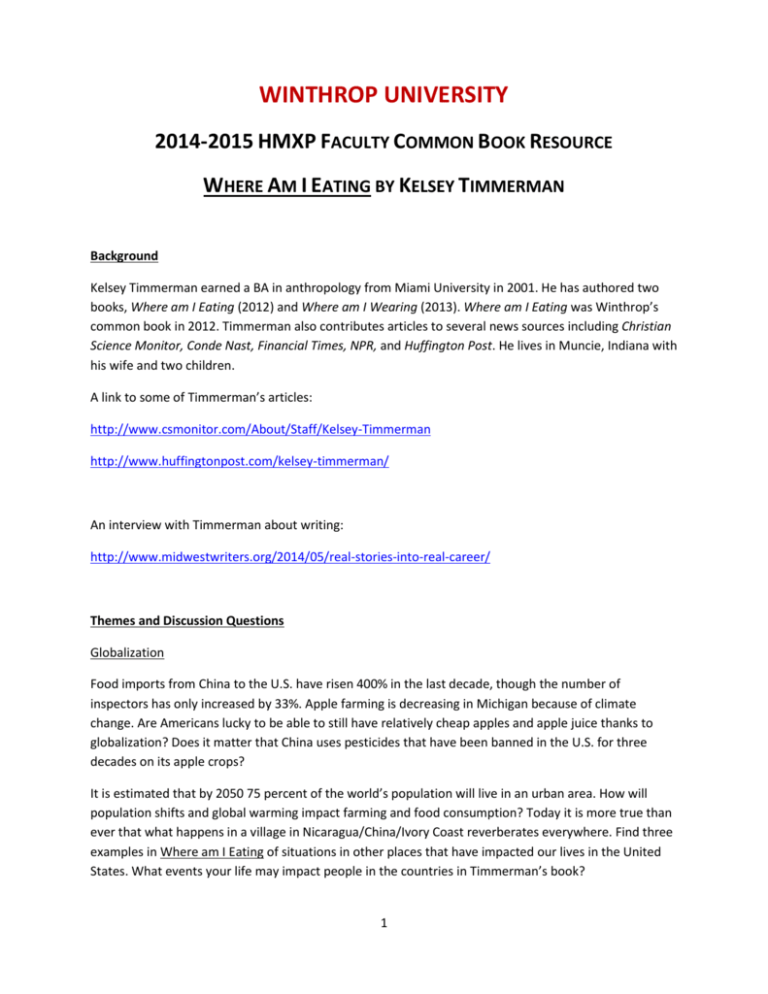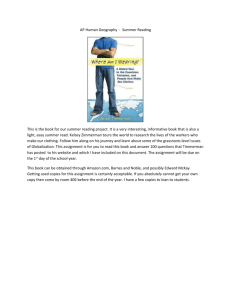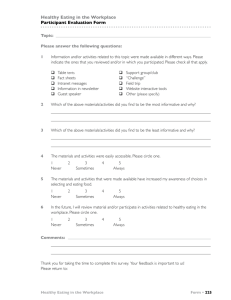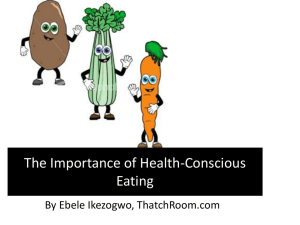Timmerman Resource by Ms. Moyon
advertisement

WINTHROP UNIVERSITY 2014-2015 HMXP FACULTY COMMON BOOK RESOURCE WHERE AM I EATING BY KELSEY TIMMERMAN Background Kelsey Timmerman earned a BA in anthropology from Miami University in 2001. He has authored two books, Where am I Eating (2012) and Where am I Wearing (2013). Where am I Eating was Winthrop’s common book in 2012. Timmerman also contributes articles to several news sources including Christian Science Monitor, Conde Nast, Financial Times, NPR, and Huffington Post. He lives in Muncie, Indiana with his wife and two children. A link to some of Timmerman’s articles: http://www.csmonitor.com/About/Staff/Kelsey-Timmerman http://www.huffingtonpost.com/kelsey-timmerman/ An interview with Timmerman about writing: http://www.midwestwriters.org/2014/05/real-stories-into-real-career/ Themes and Discussion Questions Globalization Food imports from China to the U.S. have risen 400% in the last decade, though the number of inspectors has only increased by 33%. Apple farming is decreasing in Michigan because of climate change. Are Americans lucky to be able to still have relatively cheap apples and apple juice thanks to globalization? Does it matter that China uses pesticides that have been banned in the U.S. for three decades on its apple crops? It is estimated that by 2050 75 percent of the world’s population will live in an urban area. How will population shifts and global warming impact farming and food consumption? Today it is more true than ever that what happens in a village in Nicaragua/China/Ivory Coast reverberates everywhere. Find three examples in Where am I Eating of situations in other places that have impacted our lives in the United States. What events your life may impact people in the countries in Timmerman’s book? 1 On page 75 Timmerman notes “We tell them that a free market is the way to prosperity even though it wasn’t our way to prosperity.” It is true that the World Bank, the International Monetary Fund and the United States all espouse this principle. Can you think of reasons it may be hard for developing countries to succeed under this principle? How would Milton Freedman respond to your argument? Reading Connections: “The Relation Between Economic Freedom and Political Freedom” (Friedman), “An Adventure of the Mind and Spirit” (Quinn), “Environmentalism: A Global History” (Guha), “Allegory of the Cave” (Plato). Economic and Political Freedom Think about Zhang Jie’s Love Must not be Forgotten and the apple farmers in Where am I Eating. How has the Chinese government improved the lives of Chinese people today (see for example page 220)? Do the middle class have a similar life to our middle class in the U.S.? How did Timmerman describe the lives of urban and rural dwellers differently? What problems still exist in China today? Could globalized food trade impact these problems? In “The Relation Between Economic Freedom and Political Freedom” Milton Friedman states that political freedom comes with the development of market mechanisms (page 59 of the HMXP Reader). Has this been the case for China? Reading Connections: “The Relation Between Economic Freedom and Political Freedom” (Friedman), “Love Must Not be Forgotten” (Jie), “The Alienation of Labor” (Marx). Materialism/Consumption In chapter four Timmerman discusses how the Arhuacan Indians feel connected to their land and the decisions that they make about their community and their food. Do you feel connected to your food? Where/how do you make decisions about your community and yourself? Do you think decisions to buy things as cheaply as possible have impacted our connection to community and land? On page 238 Timmerman states, “I realized that every bite of food is an act of conformity or rebellion. Every bit of food is a political statement.” Do you agree? What do your food choices say about your political views? Reading connections: “Of the Liberty of Thought and Discussion,” John Stuart Mill, “How did our Kids Get So Caught Up in Consumerism? Brian Swimme, “Ingroup and Outgroup,” David Myers, “White Privilege, Male Privilege” (McIntosh). Activity: Approximately 70 percent of processed foods in the US contain Genetically Modified Organisms. There are no requirements in the US to label food as such. Research the impacts of GMO’s on the land and people. Do you consume GMOs? How often? Keep a list of all the food you eat for three days and 2 analyze which foods may contain GMOs (you will need to do a little research to figure out which foods likely contain GMOs). Possible paper questions: Do you think that our drive for more food, more quickly and cheaply has created our dependence on GMO crops? GMO crops are mostly banned in the European Union and in other developed countries. Should the U.S. government expand its power and require labeling of GMO foods? Should the government ban or test GMO foods more extensively? Here is a link to a new article in favor of GMOs: http://www.usnews.com/opinion/articles/2013/11/04/scientific-evidence-doesntshow-gmos-are-harmful. Advertisement It seems that Starbuck’s C.A.F.E standards create working conditions not very different from farms without C.A.F.E. standards. Despite this, marketing has led Starbucks coffee consumers to feel good about the working conditions of Starbucks coffee bean farmers. Why do consumers continue to believe in the C.A.F.E. standards despite evidence otherwise? How has western popularity of fairness standards hurt farmers? “How did our kids get so caught up in consumerism?” (Swimme), “Why do we Need a Public Affairs Mission?” (Bellah), “The Compelling Tangle of Energy and American Society” (Sovacool and Brown), “An Adventure of the Mind and Spirit” Quinn. Alienation/Exploitation/Fair Trade Slavery There are approximately 160,000 forced adult laborers in the Ivory Coast. 10,000 children in western Africa are also forced into labor. Do you think eating only Fair Trade Certified chocolate would help or hurt people in the Ivory Coast? Now that you know about the problems surrounding cocoa bean farming in Africa will this impact your consumption of chocolate? How would Emerson respond to arguments for better working conditions (see page 89 of the HMXP Reader)? Reading connections: “Self-Reliance” (Emerson), “Patriotism and Cosmpolitanism” (Nussbaum), “Alienation of Labor” (Marx), “The Ones Who Walk Away from Omelas” (LeGuin). For an article on slavery around the world today (including 60,000 in the US): http://www.washingtonpost.com/blogs/worldviews/wp/2013/10/17/this-map-shows-where-theworlds-30-million-slaves-live-there-are-60000-in-the-u-s Working conditions Bananeros are exposed to extremely difficult conditions from the moment they leave for work until they get home. This includes their transportation to and from work, the risk of snakebites, the possibility of 3 dismemberment and more. Do the large banana conglomerates owe the workers a safer working environment? Do US corporations have a moral obligation offer the same working conditions to foreign workers as US workers? Why or why not? Has our demand for cheap and plentiful bananas impacted the everyday lives of banana workers? In “Lobster: A Product of Nicarague” we learn that Sysco and Red Lobster buy most of the Nicaraguan lobsters. Should they bear any responsibility for the lobster divers’ working conditions? What options are there for young Nicaraguans other than lobsters and cocaine (white lobster)? Do you think that the workers would like to have safer working conditions even if it means catching less lobster and earning less money? Is there any way for one to make responsible seafood purchases? What may be the outcome of those decisions? Reading connections: “Universal Declaration of Human Rights,” “Self-Reliance” (Emerson), “Patriotism and Cosmpolitanism” (Nussbaum), “Alienation of Labor” (Marx). Company Store Dole Foods owns the local grocery store where banana workers buy their groceries. Dole subtracts what is owed from worker’s paychecks. Since Reconstruction some American companies have had similar arrangements --even today in smaller towns with one large employer. There has been much bad press (and negative songs, such as Johnny Cash’s “Sixteen Tons”) in the United States about company stores. Owners say if they did not bring supplies to the population no one would. Is there a problem with the company store concept? If so, what is it? How should employers re-tool the concept (if at all)? Climate Change and Education “Coffee: Product of Columbia:” how is climate changing the way that coffee is produced today? Because of climate change some farms are moving from Central America to other areas of the world, including Vietnam. Coffee is the biggest employer in some Latin American countries and climate change is not only an issue for farmers, but also the entire population. Is there anything Latin American countries could do to improve the situation in their countries? Could they use the example of the government in China helping apple farmers? Is it fair to ask them to reduce greenhouse gasses (think Guha)? Does Timmerman see a connection between education and environmentalism? Readings: “Environmentalism: A Global History” (Guha), “Simple in Means, Rich in Ends” (Bodian), “The Compelling Tangle of Energy and Society” (Sovacool and Brown). The Sacred How may the U.S. Slow Food Movement be seen as a faith? Has it impacted the way that we view food? Readings: “Simple in Means, Rich in Ends” (Bodian), “What Faith Is” (Tillich). 4 5 Writing Prompt ideas 1) Prince Perigord of France (1754-1839) said that the ideal cup of coffee is “black as the devil, hot as hell, pure as an angel, sweet as love.” Can coffee be “sweet as love” when it is farmed in subpar conditions with little assurance of worker safety or fairness of living standards? The concept of utilitarianism states that actions are right if they benefit the majority (John Stuart Mill). Does this make the worker’s conditions acceptable? How can consumers enjoy food or beverage with the knowledge that it likely came from people working in inhumane conditions? Must we live like the citizens of Omelas in LeGuin’s “The Ones Who Walk Away from Omelas”? How would Emerson respond to all of this? Write a thesis driven essay arguing for the position of one of the following authors on the situation of the workers: Bandura, Mill, Emerson, Marx. Offer counter-arguments and deeper analysis with one or two other texts, for example Where am I Eating, Bill of Rights, “The Universal Declaration of Human Rights,” “The Ones who Walk Away from Omelas,” “Why do We Need a Public Affairs Mission?” or some of those mentioned above. 2) According to the 2012 International Monetary Fund “World Economic Outlook” report, Ivory Coast is expected to be the 17th fastest growing economy in the world in the next five years, Ghana is 16th, China is ninth (http://www.imf.org/external/pubs/ft/weo/2012/02/index.htm). According to Milton Friedman and other economists today, capitalist systems require growth to thrive. Countries need to increase production and industry to grow and therefore improve people’s standard of living. Unfortunately this may also create pollution, which in turn may lead to climate change. In “Environmentalism a Global History” Ramachandra Guha points out that the developed and the developing world see rules to limit climate change in very different ways. Developing countries saw the initiation of climate standards as “the emergence of a new imperialism, of new conditionalities and new obstacles to the alleviation of poverty (247).” How does climate change impact people in Where am I Eating? What do you think is more important to them: climate change or growth? Does economic improvement of the lives of many people trump additional damage to the environment? Developed countries enjoy high standards of living and emit some of the highest levels of greenhouse gasses and other pollutants. Is it fair to ask developing countries to reduce their emissions? In a thesis driven essay choose a section of Where am I Eating and discuss the impact of economic growth and a changing climate. Make an argument for or against more stringent environmental standards. Offer counter-arguments and deeper analysis using one or two other texts from the HMXP Reader. 3) What is the question at issue in Where am I Eating? How does Kelsey Timmerman resolve it? How would you describe Kelsey Timmerman’s worldview? Which 2-3 authors from the HMXP Reader best represent Timmerman’s world view? Explain. 6 Fall Common Book Speakers September 30: Food Matters: Community, Class and Cost. Dr Simone Camel, Instructor, Department of Human Nutrition September 29-October 3: Food Matters: Vote with your Fork. Thompson Dining Hall offers education and common book events October 23: Food Matters: Ethics and Economics. Dr Laura Ullrich, Associate Professor of Economics Tentative: November 13: Food Matters: Chemistry and Consumption. Dr Nick Grossoehme, Assistant Professor of Chemistry and Dr Janice Chism, Professor of Biology and Anthropology Please note: Kelsey Timmerman will be visiting in the spring. More details to follow soon. Resources: Timmerman’s photo stream in Flickr. You can pull photos for your lecture: https://www.flickr.com/photos/kelseytimmerman/sets/ http://whereamiwearing.com/curriculum/ http://www.bonappetit.com/entertaining-style/gift-guides/article/interview-with-kelsey-timmermanauthor-of-where-am-i-eating Further Interest For students interested in more classes related to Where am I Eating: Environmental Sciences and Studies: http://www.winthrop.edu/ENVS/ Department of Human Nutrition: http://www.winthrop.edu/cas/nutrition/ Peace, Justice and Conflict Resolution program: http://www.winthrop.edu/cas/peace/ International Studies: http://www.winthrop.edu/cas/international/ 7 8





